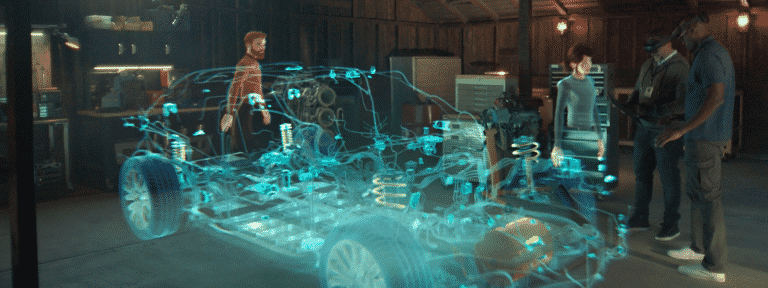Mesh is the new mixed reality platform of Microsoft that offers a powerful experience, including the ability to holoportation for people. Holoportation means that one’s own ports are holographic for a collaborative meeting or interaction in another space.
According to the company, Mesh can use 3D capture technology to beam a lifelike image of a person into a virtual scene. At Microsoft’s Ignite conference, Mesh was demonstrated. The entire keynote was created for mixed reality, with avatars representing “people attending the conference from living rooms and home offices around the world.” Mesh is built on the Azure cloud platform in Microsoft and allows developers to build apps that support multiple user mixed realities. Mesh would enable cooperation at a mixed level of reality, and the support for Microsoft multi-devices is the same.
“This has been the dream for mixed reality, the idea from the very beginning. You can actually feel like you’re in the same place with someone sharing content or you can teleport from different mixed reality devices and be present with people even when you’re not physically together,” Microsoft Technical Fellow Alex Kipman said, according to an official blog post.
What is Microsoft Mesh?
Mesh is not an app or device, but a Microsoft platform that supports several apps, not only HoloLens. According to Microsoft, Mesh will fully support HoloLenses, HP Reverb G2 or Oculus Quest 2 head-mountable displays such as iOS, Android, PC, and Mac for a 2-dimensional viewpoint, even for phones and tablets. Users can connect from anywhere to Mesh.
Mesh, thanks to its powerful mixed reality experience, “will also enable geographically distributed teams to have more collaborative meetings, conduct virtual design sessions, assist others, learn together, and host virtual social meetups,” according to Microsoft. Depending on which option a user chooses, their avatars or holographic selves will be present in the virtual experience.
Microsoft says the technology is the result of years’ research and development, ranging from hand and eye-tracking to the development of HoloLens to the creation of continuous holograms and models that create expressive avatars. Mesh also has the security and privacy features of Azure’s company.
According to Microsoft, Mesh could “physically traverse a holographic model of an under-construction factory that could enable architects and engineers to see how all pieces of equipment fit into three dimensions, possibly avoiding costly mistakes.”
Microsoft Mesh Launch Details:
Microsoft said Mesh will offer “a comprehensive range of AI-powered tools for avatars, session management, spatial rendering, multi-user synchronization, and collaboration in mixed reality.” It is free to create solutions that work on many different devices: HoloLens 2, an array of headsets for virtual reality, smartphones, tablets, and PCs.
Two apps built on the Microsoft Mesh Platform have been announced by Microsoft. One is a preview of the HoloLens Microsoft Mesh app, which allows team members to cooperate remotely and can be downloaded. It is also possible for customers to ask about access to the new Mesh-enabled AltspaceVR that will allow enterprise-grade security features, such as secure sign-ins, session management, and privacy compliance, to meetings and work gathers in virtual reality. Microsoft Mesh- integration is also coming to products such as Microsoft Teams and Dynamics 365.

